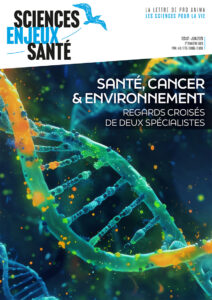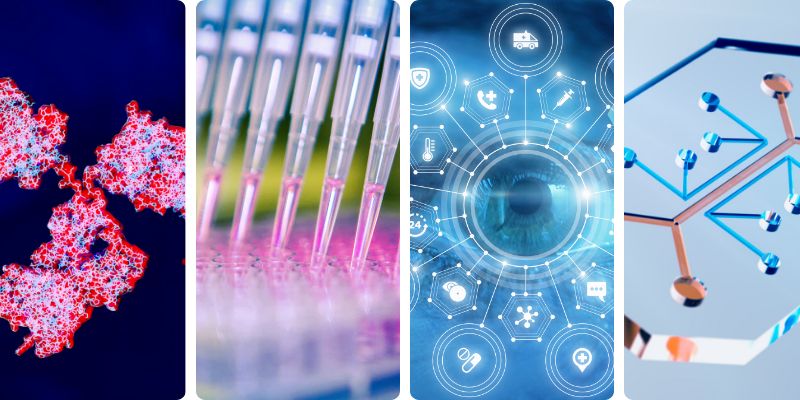
Reimagining Women’s HealthWith OoC, PhaKinPro : Triaging Compounds with Undesired Pharmacokinetics Profiles, OECD For a Planet Free of Harm from Chemicals and more
News on non-animal methods
MAY 13 - 17, 2024NEWS, REPORTS & POSITION STATEMENTS
1. European elections : the Union’s science academies call on candidates to defend education and research
This is a historic first : all the national academies of sciences (or their equivalents) of the 27 Member States of the European Union presented on May 6, 2024 a call for candidates for the 2024 European Parliament elections for the promotion of scientific research and quality education, which are free and accessible to all. The future of Europe depends on robust, open and free science and education.
2. ECI ‘Save Cruelty Free Cosmetics — Commit to a Europe Without Animal Testing’: Follow up on the actions taken by the European Commission
The ‘Save Cruelty Free Cosmetics — Commit to a Europe Without Animal Testing’ initiative was submitted to the Commission on 25 January 2023, after having gathered 1,217,916 verified statements of support. The Commission adopted a Communication on 25 July 2023 setting out its response to the initiative ‘Save Cruelty Free Cosmetics — Commit to a Europe Without Animal Testing’.
In the second half of 2023, the Commission started work on a roadmap to phase out animal testing for chemical safety assessments that was announced in its reply to the ECI. A workshop involving interested stakeholders, including the organisers of the initiative, was organised on 11 and 12 December 2023, as a starting point for the development of the roadmap and an opportunity for stakeholders to provide input and discuss possible approaches for the uptake of non-animal methods in chemical legislation.
The workshop report is in preparation and should be published by June 2024.
A second workshop is planned for 25 October 2024.
Finalisation of the work on the roadmap is planned for the first quarter of the mandate of the 2024 – 2029 Commission.
3. OECD Brief : AI in health — huge potential, huge risks
The OECD has been at the frontier in defining comprehensive policy principles for trustworthy development and use of Artificial Intelligence (AI) with its 2019 Principles. The OECD AI Principles have been adopted by all OECD countries and are reflected in the G20 AI Principles. The last quarter of 2023 saw several important events and reports designed to drive the safe implementation of AI.
AI can help address some of health’s largest challenges including a depleted workforce, future threats to public health, ageing populations, and increasing complexity of health due to multiple chronic conditions. It is crucial to make use of this powerful new tool while also mitigating its risks. Oversight and robust governance will be necessary to respond rapidly to emerging issues and opportunities.
4. OECD Declaration : For a planet free of harm from chemicals and waste
The Declaration on Supporting the Achievement of the Strategic Objectives and Targets of the Global Framework on Chemicals – For a Planet Free of Harm from Chemicals and Waste (GFC) was adopted on 3 May 2024 by 38 OECD Members, the European Union and 5 non-Members in the context of the OECD Council meeting at Ministerial level. The Declaration reaffirms Adherents’ commitments to improve the safe and sustainable management of chemicals throughout their life cycle and outlines a shared position on how to support implementation of the GFC.
Following the adoption of the GFC in September 2023, the Declaration is an opportunity to highlight the commitment of OECD Members, the European Union and several non-Members to implement it and to outline the OECD’s willingness to support the GFC vis-à-vis its long-standing partners, such as other participating organisations of the Inter-Organisation Programme for the Sound Management of Chemicals (IOMC).
INTERVIEWS, NOMINATIONS & AWARDS
5. Revolutionizing neurodegenerative disease research with brain-on-chip technology
The complexity of the human brain creates significant challenges for advancing neurological drug development. Traditional two-dimensional (2D) culture models cannot accurately mimic the true physiology of human tissue. This has led to over- or underestimating cellular behaviors and drug responses in preclinical phases and many subsequent costly candidate failures in clinical trials. A similar situation is seen when relying on animal models, where a drug’s success in rodents may not reliably translate to human outcomes.
Organ-on-chips have emerged as a promising tool for advancing neurological drug development. Excited by the potential, preclinical Contract Research Organization ETAP-Lab is combining its neurotoxin manufacturing capabilities with NETRI’s NeuroFluidics technology. In a conversation with ETAP-Lab’s CEO, Nicolas Violle, Revvity delved into the details of their advanced cell models and the potential transformative impact on the field of neuroscience.
6. Mice Don’t Menstruate : Reimagining Women’s Health Using Organ Chips with Dr. Donald Ingber
In a new episode of Innovate and Elevate Podcast, host Sharon Kedar, Co-Founder of Northpond Ventures, is joined by Dr. Donald Ingber, Founding Director at Wyss Institute for Biologically Inspired Engineering at Harvard University and pioneer of the Organ Chip technology.
The Organ Chip technology already includes women’s health models and holds great promise to revolutionize this under-invested area. Because animals, namely mice, do not have menstrual cycles, their biological environments are already skewed to test any women’s health-related projects. Organ Chips are a great solution to close the data gap. Dr. Ingber shares two projects underway in partnership with the Gates Foundation : to create a cure for bacterial vaginosis and to create a non-hormonal contraceptive.
7. The NIH Announces Winners of the Complement-ARIE Challenge Competition
The NIH Common Fund Complement-ARIE program hosted this challenge as part of the strategic planning process to refine the Complement-ARIE program concept. Twenty Complement-ARIE Challenge prize winners will share the total prize purse of $1,000,000, with each winning team receiving $50,000 for their innovative solutions. The winning solutions were selected according to the official judging criteria and demonstrated out-of-the box solutions across the competition areas of in silico, in vitro, in chemico, and combinatorial methods.
Among the winners : 4D Tissue Fabrication of Human Tissue Models by 4D Tissue Fabrication ; A Sensor-Enhanced Isogenic Model of Alzheimer by NeuroTech Innovations Team ; E‑validation – Unleashing AI for Validation by Thomas Hartung’s Team ; Population Diversity in Responses to vaccination by The Rector and Visitors of the University of Virginia.
TOOLS, PLATFORMS, CALLS
8. PhaKinPro : A Web Tool for Triaging Compounds with Undesired Pharmacokinetics Profiles
Computational models that predict pharmacokinetic properties are critical to deprioritize drug candidates that emerge as hits in high-throughput screening campaigns.
Rath et al. collected, curated, and integrated a database of compounds tested in 12 major end points comprising over 10,000 unique molecules. The researchers then employed these data to build and validate binary quantitative structure – activity relationship (QSAR) models. To illustrate their utility in drug discovery, the authors used PhaKinPro models to predict the pharmacokinetic properties for drugs in the NCATS Inxight Drugs database and for all compounds in the DrugBank.
9. Opening of the Humane Research Trust’s 2024 research grants
The Humane Research Trust works at the forefront of educating, supporting, and funding current and future scientists to find alternatives to the use of all animals and animal products in medical research. The Humane Research grant scheme is currently open for research proposals, looking for researchers who are interested in developing or using non-animal techniques and methodologies in their research of human disease.
Deadline : 25 August 2024
Typical award range : £90,000 — £200,000
Find out if you are eligible for the grant
INDUSTRY, BIOTECH & PARTNERSHIPS
10. Tapping Innovative Reprogramming of Immune Cells to Deliver Next-Generation Therapies with OverT Bio
OverT Bio, a data-driven company working to unlock the curative potential of cell therapies in solid tumors, announced that it has raised $16 million in seed funding. OverT is the first to use patient’s immune response to cancer to find new receptors and targets that can be applied across the human population. The team explores the entire human genome to find new ways to make cell therapies more durable and capable of destroying cancers.
“Cell therapies have shown, at least in blood cancers, that we can aim to completely cure patients that have even the most advanced diseases rather than just prolong their survival,” said Dr. Mat Legut, co-founder and CEO of OverT. “With OverT’s ability to rapidly screen and engineer thousands of genes, we are building next-generation therapies to cure advanced cancers of the solid tissues.”
11. Google DeepMind and Isomorphic Labs : To reveal AI able to predict large swathes of molecular biology
AlphaFold 3, developed by DeepMind and Isomorphic Labs, introduces major advancements in predicting the structure of a broad range of biomolecular systems, including ligands, RNA, DNA, and protein interactions. The new model is a potentially giant leap for biological research. The companies are allowing researchers working on non-commercial projects to query the model for free through an internet-based interface.
Isomorphic Labs, which was spun out of Google DeepMind, has also begun using the system internally to speed its efforts to discover new drugs. The company currently has partnerships with Eli Lilly and Novartis aimed at developing multiple drugs, although the specifics of which diseases the companies are targeting has not been revealed.
Researchers from the companies published a paper on AlphaFold 3 in Nature.
SCIENTIFIC DISCOVERIES & PROTOCOLS
12. Cedars-Sinai Study Details Workings of Short-Term Memory
Cedars-Sinai investigators have discovered how brain cells responsible for working memory coordinate intentional focus and short-term storage of information.
To explore how working memory functions, investigators recorded the brain activity of 36 hospitalized patients who had electrodes surgically implanted in their brains as part of a procedure to diagnose epilepsy. The team recorded the activity of individual brain cells and brain waves while the patients performed a task that required use of working memory.
“In disorders such as Alzheimer’s disease or attention-deficit hyperactivity disorder, it is often not memory storage, but rather the ability to focus on and retain a memory once it is formed that is the problem,” said Rutishauser, who is a professor of Neurosurgery, Neurology and Biomedical Sciences at Cedars-Sinai. This study was conducted as part of a multi-institutional consortium funded by the NIH’s BRAIN Initiative, and led by Cedars-Sinai.
The study detailing their discovery was published in the peer-reviewed journal Nature.
13. A new in vitro model to investigate intestinal mucus
Recent research from a team at Stanford University (CA, USA) led by senior authors Gerald Fuller and Sarah Heilshorn, has used cutting-edge cell culture techniques to study intestinal mucus in vitro, avoiding the use of animal models and reducing the disruption of the mucus studied. This could be a more robust and representative model to study intestinal mucus and subsequently develop therapeutics that could harness the defensive properties of mucus against infection.
As a proof of concept for the model, the team mimicked the infection of the intestine with the parasitic worm Nippostrongylus brasiliensis, applying cytokine IL-13 to the surface to simulate the gut microenvironment during infection with this pathogen. Next, the team wants to identify how they can use this model to help improve mucus health and the treatment of infection, while also expanding the model to cover more mucus types. “We have a parallel effort to study airway mucus, looking at conditions such as cystic fibrosis and acute asthma. We also started a collaboration with a group in Berlin to develop drugs to restore a healthy mucus response,” says Fuller.


